Explanation of my 10 Ballon d'Or 1969
This is my ranking, my opinion on the Ballon d'Or of the year 1969. This ranking is based on the calendar year, not the season. What counts for this ranking is the player's regularity over the calendar year, the number of matches played, the ability to raise his level in big games, statistics (goals, assists, clean sheets, goals conceded, etc.) and trophies won (collective and individual).
#10 Karl-Heinz Schnellinger
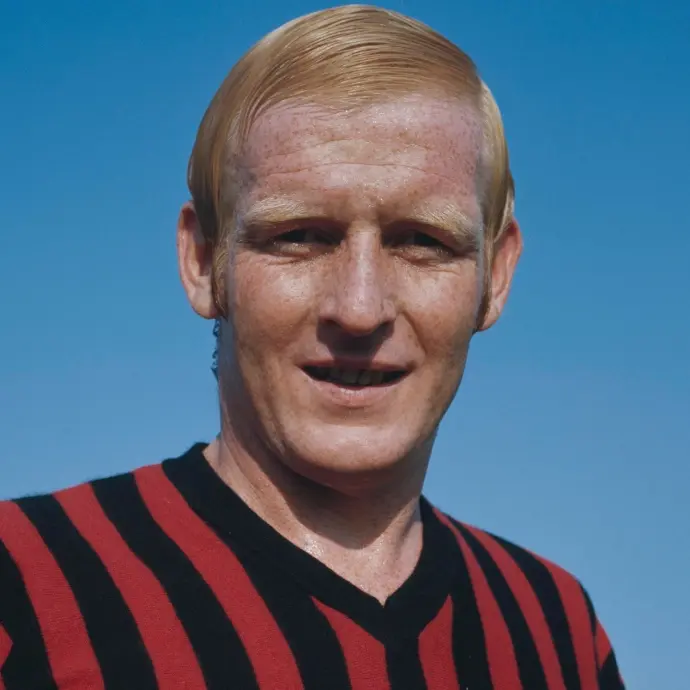
- Age : 29/30 years old
- Club : Milan AC
- Statistics : 42 games, 0 goal, / assists
- Trophies : Champions League, Intercontinental Cup
- Individual Awards : Champions League TOTY
In the calendar year 1969, Karl-Heinz Schnellinger stood as one of the most accomplished and respected defenders in European football. Playing for AC Milan, he was a cornerstone of the club’s formidable defense and played a crucial role in their historic triumph in the European Cup. That year, Milan defeated Johan Cruyff’s Ajax 4–1 in the final at the Santiago Bernabéu, with Schnellinger’s composure and tactical discipline helping to neutralize the Dutch side’s attacking threats. He also lifted the Intercontinental Cup with Milan, further cementing his status as one of the few German players to achieve such international club success at the time. Known as “Volkswagen” for his tireless consistency and reliability, Schnellinger was a rare blend of German discipline and Italian tactical sophistication. His performances in 1969 reflected his evolution into a world-class left-back and libero, capable of both rugged defending and elegant build-up play. Though defenders were rarely recognized in individual awards, Schnellinger’s contributions did not go unnoticed—he was widely regarded as one of the best in his position globally.
#9 Ove Kindvall
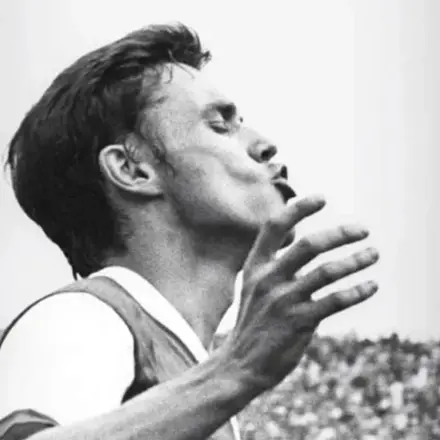
- Age : 25/26 years old
- Club : Feyenoord Rotterdam
- Statistics : 42 games, 38 goals, 4 assists
- Trophies : Eredivisie, Dutch Cup
- Individual Awards : Eredivisie TOTY, Eredivisie Golden Shoe (30 goals)
In the calendar year 1969, Ove Kindvall firmly established himself as one of Europe’s most clinical and intelligent strikers, leading Feyenoord to a historic domestic double. The Swedish forward was the Eredivisie’s top scorer with 30 goals, showcasing his lethal finishing, sharp movement, and composure in front of goal. Kindvall’s contributions were instrumental in Feyenoord winning both the Dutch league and the KNVB Cup, setting the stage for their European triumph the following year.
#8 Luigi Riva
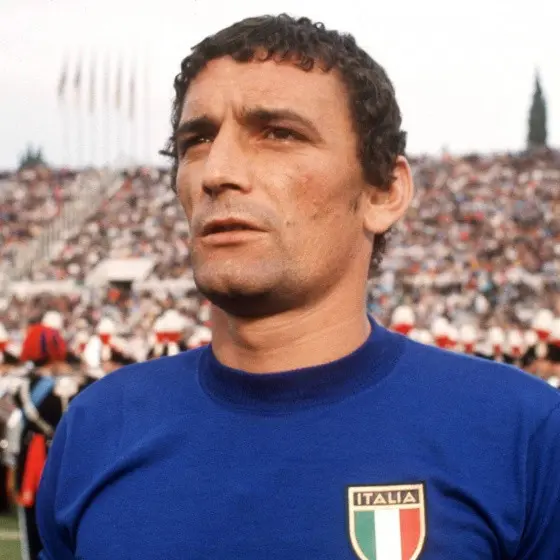
- Age : 24/25 years old
- Club : Cagliari
- Statistics : 48 games, 33 goals, / assists
- Trophies : Serie A Vice-Champion, Finalist Italian Cup
- Individual Awards : Serie A TOTY, Serie A Golden Shoe (20 goals)
In the calendar year 1969, Luigi Riva—“Rombo di Tuono” or “Roar of Thunder”—was at the peak of his powers, embodying the spirit and pride of Cagliari and Italian football. That year, he led Cagliari to a historic second-place finish in Serie A and to the final of the Coppa Italia, achievements that signaled the club’s rise as a serious contender in Italian football. Riva’s explosive left foot, aerial dominance, and ice-cold composure in front of goal earned him the Capocannoniere title as Serie A’s top scorer with 20 goals. Beyond club success, Riva was also a pillar of the Italian national team, having already helped them win the 1968 European Championship. In 1969, he continued to be Italy’s most feared striker, scoring prolifically in qualifiers and friendlies. His loyalty to Cagliari—despite lucrative offers from giants like Juventus—only deepened his legend.
#7 George Best
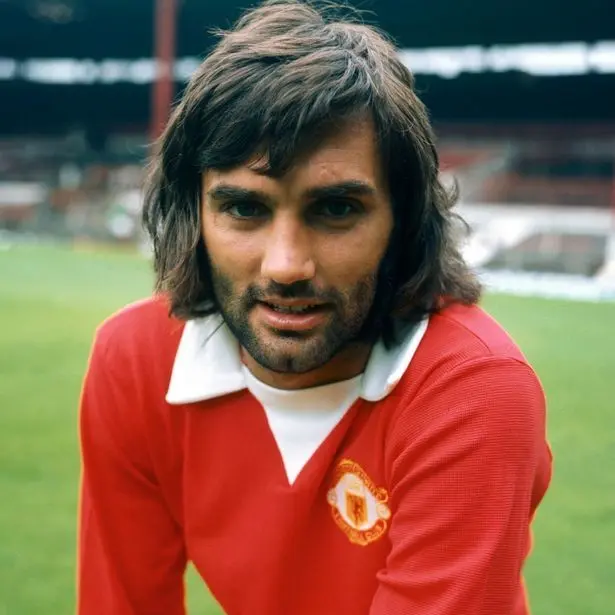
- Age : 22/23 years old
- Club : Manchester United
- Statistics : 63 games, 28 goals, / assists
- Trophies : /
- Individual Awards : /
In the calendar year 1969, George Best was at the height of his fame and footballing brilliance, dazzling fans with his unmatched flair, creativity, and charisma. Still riding the wave of Manchester United’s 1968 European Cup triumph—where he scored a legendary goal in the final—Best continued to be the heartbeat of the Red Devils’ attack. That year, he delivered a string of mesmerizing performances in the English First Division, combining dazzling dribbles, audacious goals, and an almost theatrical presence on the pitch. Though United didn’t win major silverware in 1969, Best’s individual brilliance kept him in the global spotlight, and he was a top contender in the Ballon d’Or rankings. Off the pitch, Best’s fame transcended football. Dubbed “the Fifth Beatle” for his pop-star looks and lifestyle, he became the first true celebrity footballer, appearing in advertisements and dominating tabloid headlines. His quote—“In 1969, I gave up women and alcohol. It was the worst 20 minutes of my life”—perfectly captured the mix of genius and excess that defined him. In 1969, George Best wasn’t just a footballer—he was a cultural icon, a rock star in boots, and a player whose legend was as much about artistry as it was about audacity.
#6 Tostão
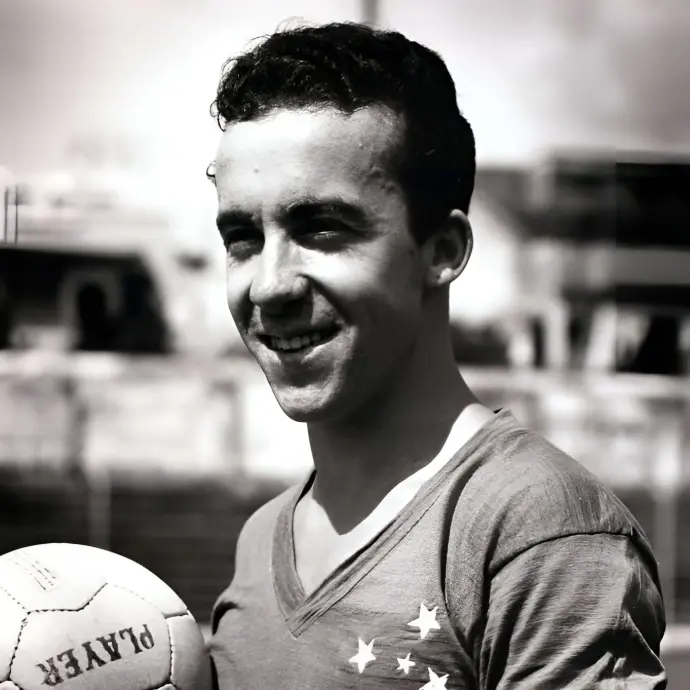
- Age : 22 years old
- Club : Cruzeiro
- Statistics : 37 games, 35 goals, / assists
- Trophies : Minas Gerais Championship, Finalist Roberto Gomes Pedrosa Tournament
- Individual Awards : Brazilian POTY
In the calendar year 1969, Tostão was at the height of his powers, widely regarded as one of the finest footballers in the world and arguably the best Brazilian player alongside Pelé. Playing for Cruzeiro, he dominated the domestic scene, winning his fifth consecutive Campeonato Mineiro title and finishing as the tournament’s top scorer. His intelligence, creativity, and left-footed precision made him the heartbeat of both club and country. That year, he also led Cruzeiro to the final of the prestigious Roberto Gomes Pedrosa tournament, finishing as its top scorer with 12 goals. Internationally, Tostão was instrumental in Brazil’s qualification campaign for the 1970 World Cup, scoring prolifically and forming a telepathic understanding with Pelé. His ability to drop deep, link play, and create space made him a precursor to the modern false 9, and his selfless style of play was crucial to the fluidity of Brazil’s legendary attack. Despite suffering a serious eye injury in 1969—a detached retina that nearly ended his career—he recovered in time to become a key figure in Brazil’s 1970 World Cup triumph. In 1969, Tostão wasn’t just a star—he was the quiet genius who made the world’s most beautiful team even more complete.
#5 Franz Beckenbauer
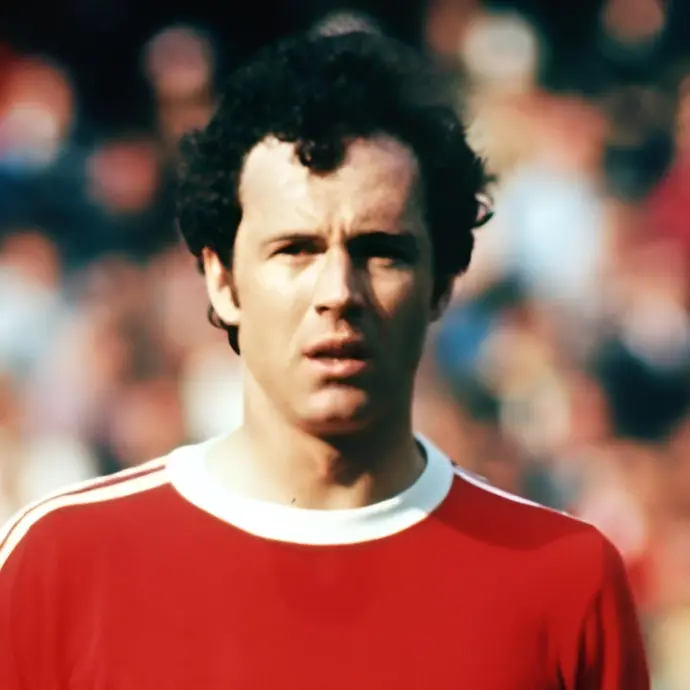
- Age : 24/25 years old
- Club : Bayern Munich
- Statistics : 45 games, 5 goals, 7 assists
- Trophies : Bundesliga, German Cup
- Individual Awards : Bundesliga TOTY
In the calendar year 1969, Franz Beckenbauer continued his ascent as one of the most influential and elegant defenders in world football. As the tactical brain of Bayern Munich, he played a pivotal role in securing the club’s first Bundesliga title, as well as lifting the DFB-Pokal, completing a historic domestic double. Beckenbauer’s transformation into a modern libero was in full swing—he was no longer just a defender, but a deep-lying playmaker who dictated the rhythm of matches with his composure, vision, and precise passing. Internationally, he remained a cornerstone of the West German national team, helping them prepare for the 1970 World Cup with a series of strong performances in qualifiers.
#4 Gerd Müller
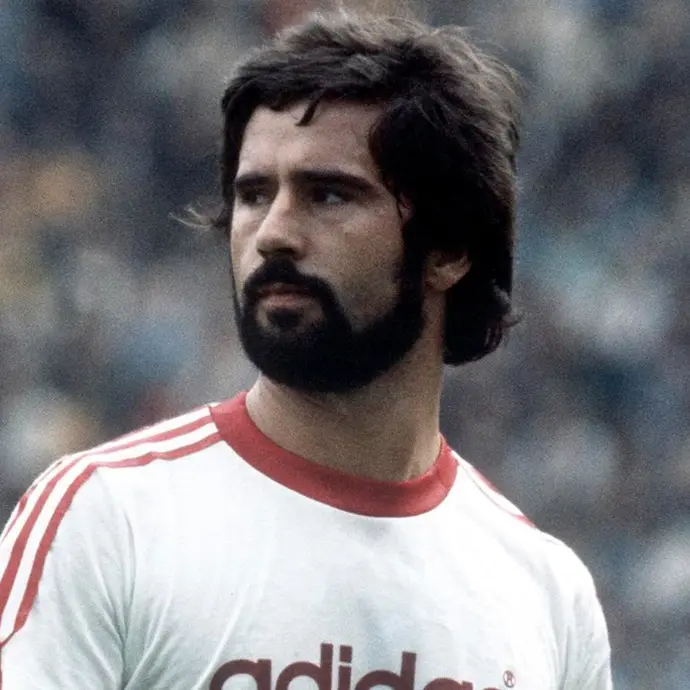
- Age : 23/24 years old
- Club : Bayern Munich
- Statistics : 41 games, 43 goals, 5 assists
- Trophies : Bundesliga, German Cup
- Individual Awards : German POTY, Bundesliga TOTY, Bundesliga Golden Shoe (30 goals)
In the calendar year 1969, Gerd Müller was already carving out his legacy as one of the most prolific goal scorers the game had ever seen. Leading the line for Bayern Munich, he finished the 1968–69 Bundesliga season as the league’s top scorer with 30 goals, powering the club to its first-ever Bundesliga title. He also played a decisive role in Bayern’s DFB-Pokal triumph, scoring twice in the final and finishing as the tournament’s top scorer. His incredible goal tally and consistency earned him the Bundesliga Player of the Year award. Internationally, Müller was becoming a central figure for West Germany, scoring regularly in qualifiers and friendlies as the team prepared for the 1970 World Cup.
#3 Pelé
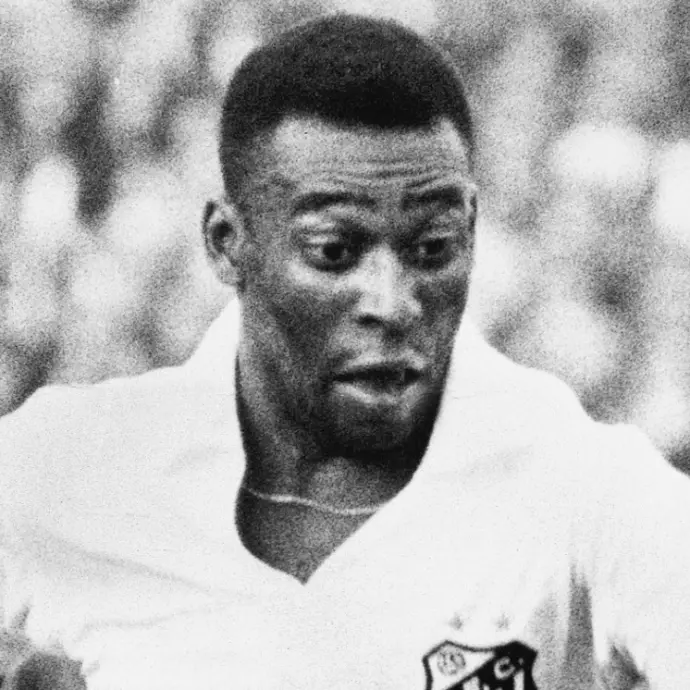
- Age : 28/29 years old
- Club : Santos FC
- Statistics : 52 games, 47 goals, 17 assists
- Trophies : São Paulo Championship
- Individual Awards : São Paulo Championship Golden Shoe (26 goals)
Johan Cruyff did not win any major trophies in the calendar year 1969, and that year marked a rare pause in Ajax’s meteoric rise. Despite his brilliance on the pitch, Ajax finished second in the Eredivisie and were eliminated early in the European Cup. Cruyff himself struggled with injuries during parts of the season, which limited his impact compared to his usual standards. Nevertheless, his influence remained undeniable: his vision, dribbling, and tactical intelligence continued to shape Ajax’s style and the evolution of “Total Football.”
#3 Johan Cruyff
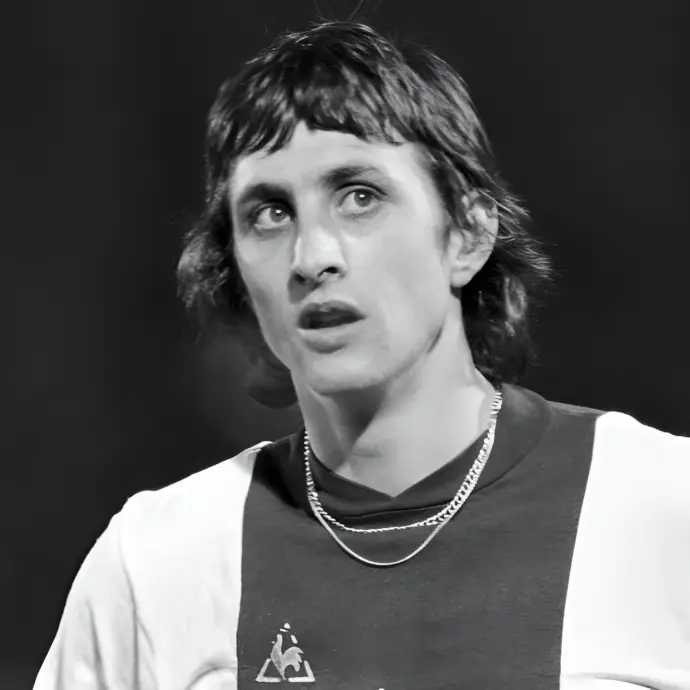
- Age : 21/22 years old
- Club : Ajax Amsterdam
- Statistics : 44 games, 34 goals, 28 assists
- Trophies : Finalist Champions League, Eredivisie Vice-Champion
- Individual Awards : Champions League TOTY, Eredivisie TOTY
In the calendar year 1969, Pelé remained a towering figure in world football, even as his international appearances became less frequent. Playing for Santos FC, he continued to mesmerize fans with his extraordinary skill, vision, and goal-scoring prowess. Although Santos did not win major silverware that year, Pelé’s influence on the pitch was undiminished—he scored prolifically in domestic competitions and international friendlies, and his global fame only grew as Santos toured extensively, playing high-profile matches across continents. His performances in 1969 were a prelude to the legendary 1970 World Cup campaign, where he would lead Brazil to glory. Even in a relatively quiet year in terms of trophies, Pelé’s brilliance, consistency, and global impact made him the undisputed king of the sport.
Winner : Gianni Rivera
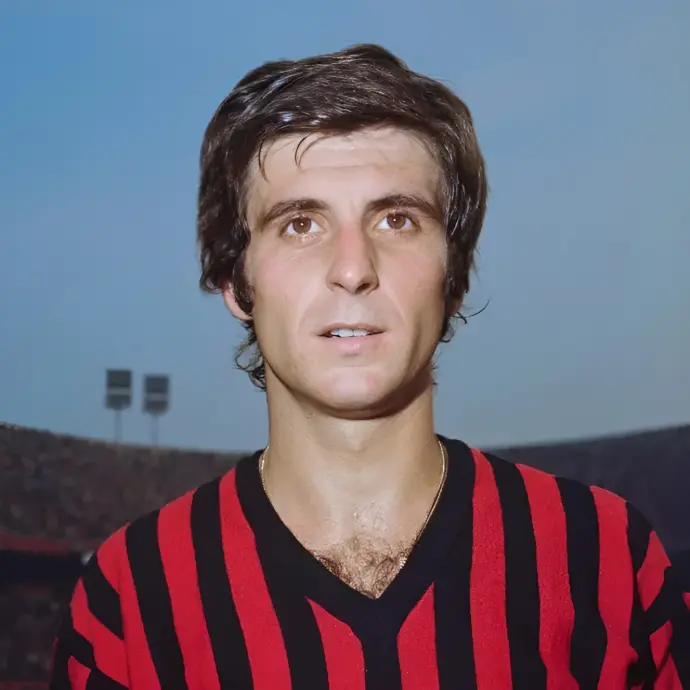
- Age : 25/26 years old
- Club : Milan AC
- Statistics : 44 games, 10 goals, 11 assists
- Trophies : Champions League, Intercontinental Cup
- Individual Awards :
Champions League TOTY
In the calendar year 1969, Gianni Rivera reached the pinnacle of his career, becoming the first Italian-born player to win the Ballon d’Or. As the elegant and cerebral playmaker of AC Milan, Rivera orchestrated one of the club’s most successful seasons, leading them to victory in the European Cup with a commanding 4–1 win over Ajax in the final. His vision, passing range, and composure under pressure were instrumental in Milan’s dominance, and he followed that triumph by helping the club win the Intercontinental Cup later that year. Rivera’s performances in 1969 were a masterclass in midfield artistry. Though not a prolific goal scorer, his ability to control the tempo and unlock defenses made him the creative soul of the Rossoneri.